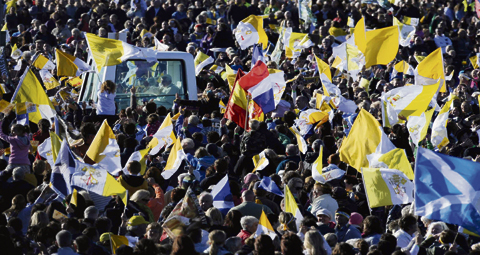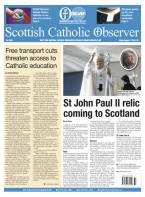March 1 | ![]() 0 COMMENTS
0 COMMENTS ![]() print
print

A Papacy filled with beauty and light
— In tribute to the Papacy of Pope Benedict XVI, ARCHBISHOP PHILIP TARTAGLIA and ARCHBISHOP EMERITUS MARIO CONTI analyse the Holy Father’s courageous decision to resign and praise his spiritual leadership over the past eight years
By Archbishop Philip Tartaglia
The decision of Pope Benedict XVI to resign the Papacy is one that will surely be discussed by historians for centuries to come. In recent days journalists have dusted off the history books—or more likely googled ‘Papal resignation’—and told us the story of Pope Gregory XII who resigned in 1415. In fact the circumstances of Pope Gregory’s decision—made to end a schism in the Church when there were three would-be ‘Popes’—tell us little about the decision we have witnessed in recent days.
A more enlightening parallel is that of the hermit Pope Celestine V who, after being elected Pope while praying and studying in his monastery, after much reflection decided to lay down the keys of Peter back in 1294 to return to a life of contemplation and study.
It is said that during the later years of the Pontificate of Blessed Pope John Paul II, the then Cardinal Ratzinger asked him to be allowed to retire and return to a life of scholarship. Such was his importance however to the Polish Pope that the request was always turned down.
And so when the cardinals elected him in 2005 there can be little doubt that Josef Ratzinger would have seen their decision as an unexpected final invitation of the Lord to serve Him in the most lonely office on earth—that of the Papacy. The decision to resign, must surely have been a similarly agonising and lonely one to take.
Each of us will have our own memories of the Pope Benedict years. We in Scotland are particularly lucky that our nation was one of the relatively few the Holy Father visited during his Pontificate. None of us who were there will ever forget the stirring and moving sight of the Bishop of Rome travel along Princes Street in Edinburgh, with his newly acquired tartan scarf much in evidence, shyly and happily waving to the crowds.
Similarly the beautiful and inspiring hours at Bellahouston when the great silence of recollection blanketed the park before Mass, and the words of encouragement and hope from the Holy Father filled so many hearts, will never be forgotten.
My own memories of that day contain another, perhaps more precious moment, because it was so personal.
It is the custom that when the Pope leaves on a plane, wherever he goes, that he be accompanied by the local Bishop to the aircraft steps. His Scottish visit ended publicly at Bellahouston Park in Glasgow, but because Glasgow Airport is in the
territory of Paisley Diocese, it fell to me to be the accompanying bishop as the Holy Father bid farewell.
I will always remember his salutation. He was clearly delighted at the welcome he had received, and I suspect, more than a
little relieved that the prophets of doom with their predictions of protest and indifference had been proved wrong. He seemed tired after the long outdoor ceremonies, but also energised. As he turned to bid me farewell, he clasped my hand in his and said in Italian: “Si vede che quì la Chiesa è viva”—I can see that here the Church here is very much alive.
It was both a compliment and a reassurance, and it is our duty in the years ahead to ensure that whoever the next Pope may be, he will always be able to look at the map of the world, and point to the little landmass of Scotland and say—whether in Italian, Spanish, French or some native language never heard in the Vatican’s majestic halls—‘the Church there is very much alive.’
As for Pope Benedict, I suspect he will retire now into an absolute seclusion. His final words to his priests in the Diocese of Rome were both moving and telling: “Pray for me as I will for you. I will always be close to you in prayer, though hidden from the world’s gaze.”
I am sure he will live out his days in prayer and study, behind the protection of Vatican walls. But though hid from view, we will never forget him—neither in our memories, nor in our prayers.
By Archbishop Emeritus Mario Conti
Not for 600 years has a Pope resigned and we have all been caught by surprise, and yet it seems that virtually everyone applauds his decision as ‘brave,’ as ‘humble,’ as ‘wise,’ and for the reasons he has given ‘in the best interest of the Church,’ and I agree.
Saints are made after they have died, and leaders appreciated after they have demitted office when what they have contributed to life can be seen as a whole. That is emerging in Pope Benedict’s case. We have known leadership by a man whose courtesy and sensitivity have always been appreciated by those who have been close to him and not had their opinions warped by the press. Pope Benedict has had his full share of scapegoating, but his response has always been measured, consistent and thoughtful, offering apologies on behalf of the Church to those who have been offended by the sins of its members.
His public actions have always been gracious and the camera has not erred where commentators have, as we saw so spectacularly during his triumphant visit to the United Kingdom. How privileged we were in Scotland to experience his presence in Edinburgh and at Bellahouston; we have been left with indelible images of tenderness and warmth. They belie both the coldness of the day and the previous attitude of the media, bathing both with a golden light which was both physical and spiritual.
I think that image of light will be the one which, with hindsight, will characterise his comparatively brief Papacy, and will be due, if in part to his sustained graciousness, to the clarity of his teaching. His encyclicals will continue to shed light, the light of reason as well as of faith, on the problems of the day; his three volumes on the life of Christ on the challenges to belief.
Well, we will remember his many addresses, but particularly those he delivered in our own country, well honed to his various audiences, whether to the state represented by Her Majesty the Queen at Holyrood Palace, to the Faithful at Bellahouston, and to politicians of every hue at Westminster Hall. In the first his words were those of courtesy to his hosts: “Your forefathers’ respect for truth and justice, for mercy and charity come to you from a faith that remains a mighty force for good in your kingdom, to the great benefit of Christians and non-Christians alike.”
In the second, to the Faithful at Bellahouston Park: “I appeal particularly to you, in accordance with your Baptismal calling and mission, not only to be examples of faith in public, but also to put the case for the promotion of faith’s wisdom and vision in the public forum.”
And to the young: “There is only one thing which lasts: the love of Jesus Christ personally for each one of you… Put aside what is worthless and learn your own dignity as children of God.”
At Westminster Hall his words to civil leaders resonated well beyond the place of their delivery: “Each generation, as it seeks to advance the common good, must ask anew: what are the requirements that governments may reasonably impose upon citizens, and how far do they extend? By what authority can moral dilemmas be resolved?” He had clearly in mind religious freedom, and in the face of a growing antipathy towards religion in an increasingly secularist society he stated clearly: “Religion is not a problem for legislators to solve, but a vital contributor to the national conversation.” I recall that in that setting and in the gentleness of his demeanour his words reached their target and were warmly applauded.
So much else could be recalled but, as we realise we have seen the last of him, we can be comforted by the thought that our memories of him and his words of faith and reason will live on to nourish our hearts and minds.











